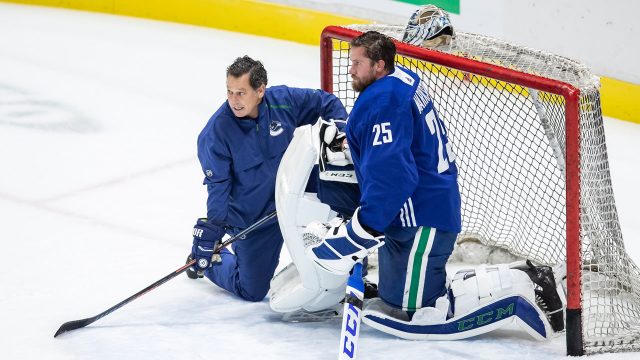
VANCOUVER — After weeks of conjecture about the status of star goaltender Thatcher Demko and his readiness for the regular season, the Vancouver Canucks clarified one thing on Wednesday: renowned goaltending coach Ian Clark will no longer be working with him.
The National Hockey League team’s announcement that Clark has been re-assigned — at his request — and replaced on the ice by minor-league goaltending coach Marko Torenius has even greater long-term ramifications than news that Demko’s recovery from a knee injury suffered in the Canucks’ playoff-opener last April may not allow him to be ready for the start of training camp in four weeks.
Clark is an elite goaltending coach, one of the best in the NHL, and has helped nearly everyone under his tutelage during two stints with the Canuck organization. Demko, the All-Star and current Vezina Trophy runner-up, is Clark’s masterpiece.
So strong was the relationship between coach and player that in 2021, when it appeared former Canuck general manager Jim Benning may not re-sign Clark, Demko made an impassioned plea in a post-game Zoom call (remember the coronavirus?) that his goalie coach be retained.
“Clarkie is, he’s unbelievable,” Demko told reporters near the end of that dismal pandemic season. “I mean, I owe probably just about everything to him. The way he’s guided me and mentored me, it’s been amazing. I just really hope that they can figure something out, and have him return.”
Clark was soon re-signed by the Canucks to a five-year extension, matching the duration of Demko’s contract, that made him one of the highest-paid goaltending coaches in the NHL. His duties were broadened and Clark became the organization’s first director of goaltending.
That title disappeared with Wednesday’s coaching shuffle, and the Clark-Demko on-ice partnership is over.
Torenius, hired by the Canucks two years ago to work with their minor-league goalies, is now the goaltending coach on Rick Tocchet’s NHL staff while Clark has been given a new portfolio as goaltending scout and goaltending development coach.
General manager Patrik Allvin emphasized in the Canucks’ press release that the re-assignment was driven by Clark’s desire to remove himself from day-to-day coaching.
“Unfortunately, Ian can no longer go on the ice regularly to do the things that have made him successful,” Allvin said. “But this new role will fit with his expertise and having Clarkie going out to find and develop talent will be a big asset to the organization.”
Clark was not quoted in the press release, and what appears to be a significant downgrade in his position spawned a lot of speculation about the 58-year-old and his role with Demko and the management group that succeeded Benning during the 2021-22 season.
Here is what we know:
• Earlier this summer, Clark went to Allvin with a proposal to remove himself from daily coaching duties.
• The request was at least partly driven by chronic knee and shoulder problems that Clark endures — injuries not uncommon for coaches (and former goalies) who have devoted their lives to the position.
• Management has a strong belief in Torenius, who helped develop key goaltending prospect Arturs Silovs.
• As of Wednesday afternoon, the Canucks were close to finalizing a deal for Torenius’ replacement with the Abbotsford Canucks.
• Although Clark had his director-of-goaltending title removed, management is expected to lean on him beyond his new scouting duties.
What we don’t know is where Clark will base himself, what other factors contributed to his request for re-assignment and what his future will be with the Canucks will be beyond his current contract.
And, of course, we don’t know how his departure from the NHL team will affect Demko.
At age 28 — and with three more years of training under Clark since he spoke out on behalf of his teacher in 2021 — Demko is a more polished goaltender and probably less reliant on his coach that he was at age 25.
But by sheer practice reps and personal interaction, the coach-player dynamic for goalies is more important than at any other position.
As for Demko’s health, the Canucks have neither confirmed nor denied that the San Diegan required another surgical procedure on his knee this summer. Allvin told reporters after free agency opened on July 1 that, at that point, Demko was continuing to rehab and had not undergone any further operations.
The injury in April ended Demko’s career-best season, which included 35 wins in 51 games, a .918 save rate and runner-up finish to Winnipeg Jet Connor Hellebuyck in Vezina Trophy balloting by the Professional Hockey Writers Association.
Although Allvin continues to eye the market to upgrade the Canucks’ goaltending depth, even if any potential addition may be as modest as a professional tryout agreement for training camp, the team still expects Demko to be ready for the season-opener on Oct. 4.
But for the first time in Demko’s NHL career, it won’t be Clark who is preparing him.